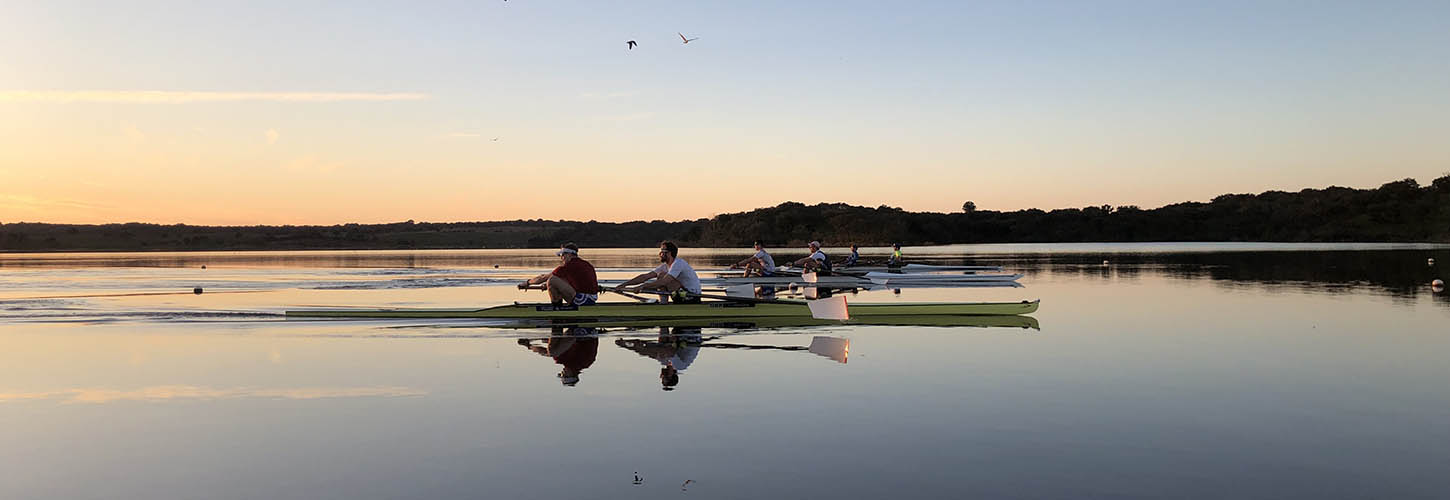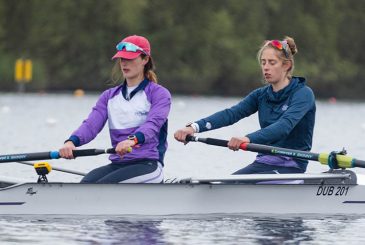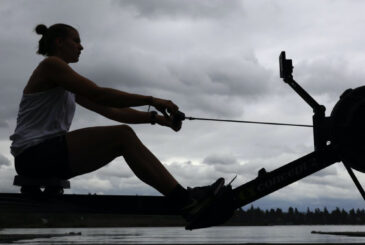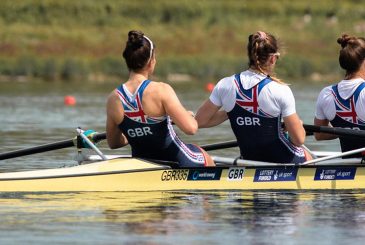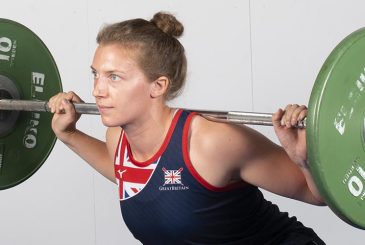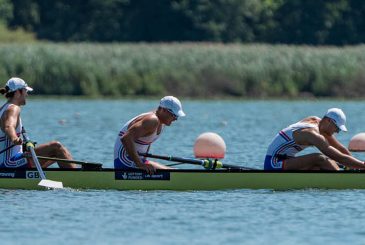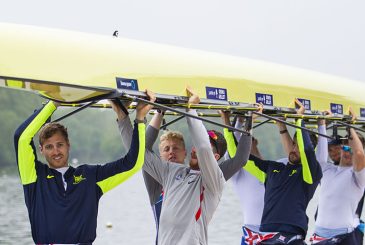So far in this series of articles I’ve discussed how best to design your training programme to build endurance and strength for rowing. This article will take a different angle and focus on the use of training camps within an elite training programme and what you should consider when planning both the camps you undertake and the training programme you do when you’re there.
Home or away?
Training camps have long been a mainstay of most elite programmes. Being able to get away from life’s distractions, row long distances, eat good food that’s cooked for you and never being further than 10 minutes from your bed are seen as more than enough reason to have them in your planning.
However, they are a significant expense and travelling to locations in Europe post-Brexit has added further financial costs as well as a paperwork burden.
If finance is a limiting factor, you can still use the concept at home, either elsewhere in the UK (Oxford Brookes University have famously used Wimbleball lake for many years), or by creating a training camp atmosphere at your usual training base.
The main physiological purpose of a training camp is to overload the athletes to achieve super-compensation and this is made far easier if motivation is higher (hence nice European venues!), but if you are limited to staying at home then encourage athletes who live further away to move in with those who are nearer by; take it in turns to make big vats of food for everyone; organize activities in the afternoons such as film nights or a meal out; and plan different sessions than you normally would such as education (nutrition, race plans etc) or fartlek/interval or racing starts sessions.
Land vs water training camps
The GB Rowing Team goes on a combination of land and water-based camps during the year.
Although a training camp that doesn’t involve boats may seem unviable to many programmes, it is worth considering what your aims are and whether you could benefit from a land-based camp, even if it is at home. These camps are used by the GB team to be able to overstress the training efficiently by limiting the rowing specific training. For example, a bike-based camp can result in many more hours of training than boat-based activities. Similarly, with good recovery and nutrition, land camps are a great time to make strength gains in the gym; the challenge of doing this during traditional rowing training was highlighted in the previous article.
For water-based camps it is vital to match the time of year you go with your aims. For example, if the camp is a volume-based camp where perhaps all athletes mix in together in crews or row in small boats, then you might wish this to be earlier in the year. If you’re looking for a camp where you form crews and prepare for competition then this should be closer to the racing season.
If you’re preparing athletes for GB Trials and/or international regattas, it’s worth considering that meaningful physiological gains to achieve the power requirements of this level of racing take a long time to develop and therefore the use of a training camp, or specific overloaded periods, may be beneficial earlier in the year than clubs have typically planned them.
Appropriate increases in training
Although training camps are an ideal opportunity to up the training volume in your programme, your camp plan must manage the training load to minimize illness and injury by considering the percentage increase in training volume (time or distance) and any modality changes such as more weight training or running.
Athletes are most vulnerable when their short term ‘load’ (acute) is significantly higher than their average ‘load’ (chronic). A sensible guide is to limit week on week increases to 10-15%, so if your camp plan involves a significant increase in volume, consider increasing training in the weeks preceding the camp to minimize the step change. Nevertheless, with due care such as increasing stretching and core based work and increasing nutritional and recovery elements, you should be able to increase volume by more than 10% in a training camp environment and there is increasing research to suggest caution when using such simple rules when calculating training load changes1.
It’s also worth remembering that the training you prescribe athletes is ‘external’ load and can be very easily measured, but ‘internal’ load such as life stressors, nutrition, menstrual cycle, robustness and health are very hard to measure. This is generally the reason why an increase in external load results in injury or illness. When on camp, it’s often worth having a way of checking daily wellbeing such as a morning monitoring form that allows the athlete to report how they’re managing the load, body mass, sleep quality and perceived shape are common metrics2.
Altitude and heat
Camps that deliberately involve either altitude (hypoxic) or heat, are probably the most specialist type. Traditional altitude training involves being above 2,000m for three to four weeks to stimulate red blood cell production (erythropoiesis)3, which is a stretch even for the most well-funded of rowing teams.

For those who can manage it, there are other, less well-known benefits of altitude training too, which could be equally valuable to rowers. Research has found that altitude training aids better muscle buffering of lactic acid4, greater mitochondrial efficiency resulting in better rowing economy, and ventilatory improvements5. As a result, you can increase the total load while managing the mechanical load of the athlete (achieving more physiological stress for the same training time or intensity).
Research has found that heat training increases performance through improvements in lactate threshold, like altitude training6, and may be particularly useful prior to summer races in particularly hot climates (e.g. southern Europe). Heat training has also been found to improve performance in cooler locations too7.
Conclusion
The use of training camps in elite training can be hugely beneficial both in physiological terms and for motivation and crew formation. The importance of knowing how much load you are doing prior to the camp and during the camp is vital, especially if you are going away during a high stress period (prior to exams, for example). Finally, remember that increasing training volume on a camp is much easier when motivation is higher, so consider that when selecting the venue, the type of training you do and ultimately what the camp’s main goal or challenge is so athletes are clear what their focus should be.
The final article in this series of six provides some example training programmes, which illustrate how all of the points so far can be put into practice.
References
- Gabbett, T. J. (2020) Debunking the myths about training load, injury and performance: empirical evidence, hot topics and recommendations for practitioners. British Journal of Sports Medicine 2020;54:58-66. https://doi.org/10.1136/bjsports-2018-099784
- Saw, A.E.; Halson, S.L.; Mujika, I. (2018) Monitoring Athletes during Training Camps: Observations and Translatable Strategies from Elite Road Cyclists and Swimmers. Sports 2018, 6, 63. https://doi.org/10.3390/sports6030063
- Semenza, G. L. (2000). HIF-1: mediator of physiological and pathophysiological responses to hypoxia. Journal of Applied Physiology, 88(4), 1474-1480. 10.1152/jappl.2000.88.4.1474
- Gore, C. J., Clark, S. A., & Saunders, P. U. (2007). Nonhematological Mechanisms of Improved Sea-Level Performance after Hypoxic Exposure. Medicine and Science in Sports and Exercise, 39(9), 1600-1609. 10.1249/mss.0b013e3180de49d3
- Gore, C. J., Sharpe, K., Garvican-Lewis, L. A., Saunders, P. U., Humberstone, C. E., Robertson, E. Y., Wachsmuth, N. B., Clark, S. A., McLean, B. D., Friedmann-Bette, B., Neya, M., Pottgiesser, T., Schumacher, Y. O., & Schmidt, W. F. (2013). Altitude training and haemoglobin mass from the optimised carbon monoxide rebreathing method determined by a meta-analysis. British Journal of Sports Medicine, 47(Suppl 1), i31-i39. 10.1136/bjsports-2013-092840
- Baranauskas, Marissa N.; Constantini, Keren; Paris, Hunter L.; Wiggins, Chad C.; Schlader, Zachary J.; Chapman, Robert F.. (2021) Heat Versus Altitude Training for Endurance Performance at Sea Level. Exercise and Sport Sciences Reviews 49(1):p 50-58, January 2021. | DOI: 10.1249/JES.0000000000000238
- Lorenzo, S., Halliwill, J. R., Sawka, M. N., and Minson, C. T. (2010). Heat acclimation improves exercise performance. Journal of Applied Physiology, 109(4), 1140-1147.
Photos: Dan Moore.


